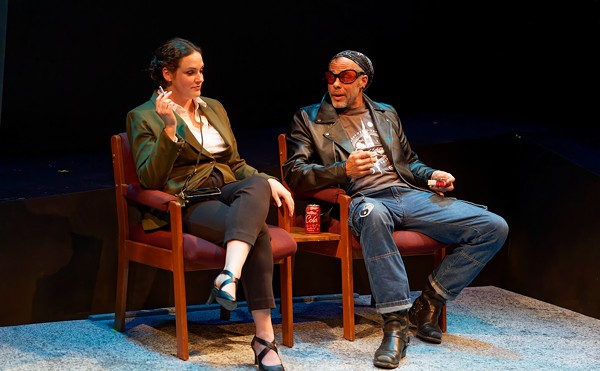Kevin Beyer anchors the show as Dodge, the family's alcoholic patriarch, now bedridden and dying. His painful coughing and scratchy voice reveal the visceral conflicts he faces as he tries (and fails) to maintain control over his home and family. Sally Eaton plays Halie, Dodge's wife. Her offstage voice floats down to him from her upstairs bedroom, a ghostly presence who finally reveals herself dressed in black on her way to church. Their oldest son Tilden (David Wassilak) completes the unholy trinity of this disintegrating household. He makes his first entrance carrying an armful of sweet corn, his gaunt body, haunted eyes and apparent mental disability contrasting with Halie's description of him as a clever high school football player. Shepard is adept at making the audience ask questions: What happened to destroy Tilden's mind? Why do his parents want to keep him from going outside? And what is the secret Halie warns Dodge not to talk about?
The first act ends with the sinister appearance of another son, Bradley (William Roth), who brutally and inexplicably shaves the hair off his sleeping father's head. The second act introduces Vince, Tilden's estranged son (or so he says), who has come with his girlfriend Shelly for a surprise visit. As Vince, Jason Garrison is believably distraught to find his grandparents' house in disarray and a father and grandfather who don't seem to recognize him. Shelley (Marissa Barbeau) finds herself caught in a miserable situation but ultimately makes the best of it, finding a connection with Tilden and Dodge that infuriates Vince. Act Three brings back Halie with her good friend Father Dewis (William Alverson), and the stage is finally set for revelation and revenge. Those not related to the family manage to flee, but the conclusion suggests that blood ties are both powerful and inescapable.
Milt Zoth directs Buried Child with clean, minimalistic lines. Shepard's language is clearly heard. The family secrets, while partially revealed, are never fully explained — but the actors are never confused about their actions. Their commitment to character carries the play to its inevitable end, making the viewer care about this failing family.
Buried Child is reminiscent of Pinter's The Homecoming (and not only because it was presented in this same theater a few years ago and also featured Kevin Beyer as the tortured and torturous father). It also seems to draw on O'Neill's Long Day's Journey Into Night. Pinter, O'Neill and Shepard probe similar issues: relationships between brothers and fathers, the sexual and life-giving forces of women, the demise of the nuclear family. This gritty material, full of tobacco spit and vegetable peels, needs the respite provided by its two intermissions, which give the audience a chance to breathe and Shepard's mysterious images time to sink deeper into the mind.





